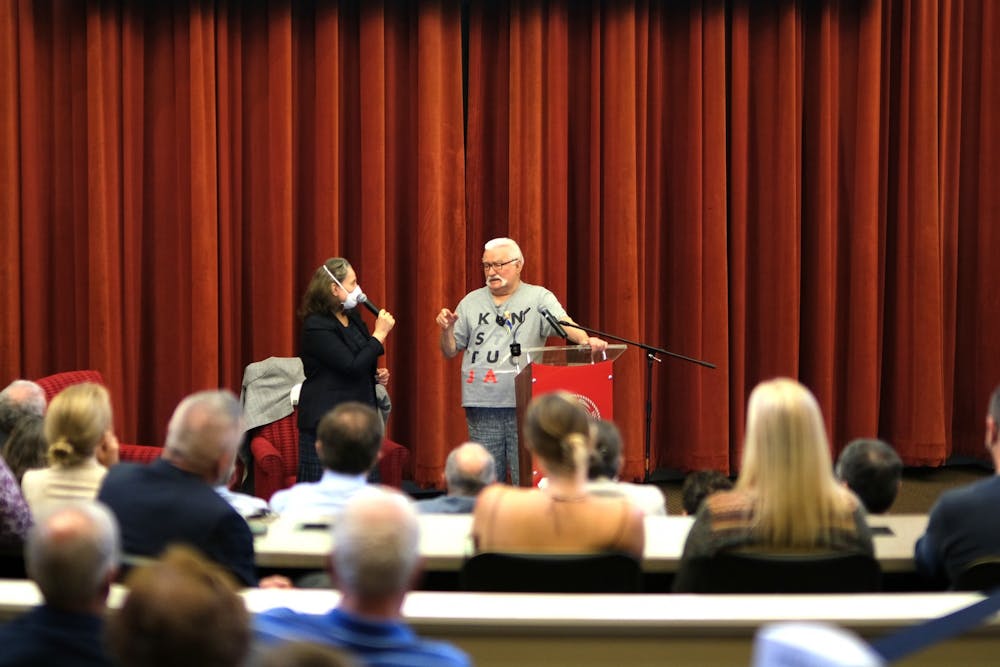A dissident championing democracy, Nobel Peace Prize winner and former president of Poland, Lech Walesa, spoke at Miami University this past Thursday to students, faculty and Oxford community members.
While he spoke in-depth about the invasion of Ukraine and his past dealings with Russia, Walesa also spoke about the future and how students like those at Miami fit into it.
“I have to convince you, you are responsible for the world,” Walesa said.
The lecture was hosted by the Menard Family Center for Democracy. Anna Kłosowska, professor of French, served as translator for the event, which was held in Taylor Auditorium and live streamed over Zoom. Before moving to the U.S. for graduate school, Kłosowska grew up in Poland during Walesa’s rise to prominence.
A member of the working class, Walesa was a shipyard worker in Poland until being fired and having to support his family of eight children through temporary work. Walesa joined with other activists in the 1970s to organize non-communist trade unions.
In the summer of 1980, Walesa led a worker’s strike in the shipyard he had previously been employed by, demanding workers’ rights. Walesa became leader of the region’s Solidarity Movement, and that workers’ strike set off a wave of strikes throughout Poland that led to the eventual overthrowing of the Soviet Union’s communist reign in the country.
“The theorists all said there was no chance [of overthrowing communism] without war,” Walesa said. “I said ‘who asked you?’”
Walesa discussed creating a new European Union to adapt to the current political climate.
“Half of Europe wants to be free, and the other half says no,” Walesa said. “And each side is convinced their ideas are more valid.”
Walesa classified the issues facing our world into three broader problems.
First, Walesa says leaders must define what the foundation of this new global period is as different countries have different foundations. Second, they have to keep countries motivated to work together when there are no breaks. Third, they need to decide what economic systems will guide the current generation.
“Communism is better than capitalism periodically, but it's so unique, and we must realize it has never succeeded. So we are left with capitalism,” Walesa said. “Putting aside the free market, we have to adjust everything else.”
Enjoy what you're reading?
Signup for our newsletter
The event attracted a broad audience with those within the Miami community and those not on campus.
John Forren, executive director of the Menard Family Center, said the Center’s goal for the event was to have the Miami and Oxford communities think deeply about politics and their role as citizens in a democracy.
“What [Walesa talked] about is ultimately not just about Ukraine or Russia, it's really about the future of democratic self-determination in the world,” Forren said. “So when people leave these kinds of events they're thinking deeply about what does it mean to live in a democratic country?”
The audience included those who knew deeply about Poland and Walesa’s background, and those with less in-depth knowledge who were interested in hearing a prominent figure speak.
Alyssa Molina, first-year mechanical engineering major, said she’s never been in the presence of someone who’s made such a big impact on the world, so the experience was gratifying.
Molina said when her family was driving to move her in at the start of the semester they drove past signs for the lecture, much to her dad’s excitement.
“I was like … that sounds like a really cool opportunity,” Molina said. “It was cool to hear his opinions on everything.”
Molina’s dad was also watching the lecture from the Zoom.
Olivia Pucciarella, sophomore journalism and media and communication major, said she’s interested in Eastern European politics because a lot of her distant relatives lived there.
“I’m a super huge fan [of Walesa’s]. I think it’s super cool how labor unions essentially overthrew a tyrannical government,” Pucciarella said. “It was more of a quiet, peaceful revolution than a violent overthrow, but I think it’s really interesting how a labor union was essentially what saved a country.”




